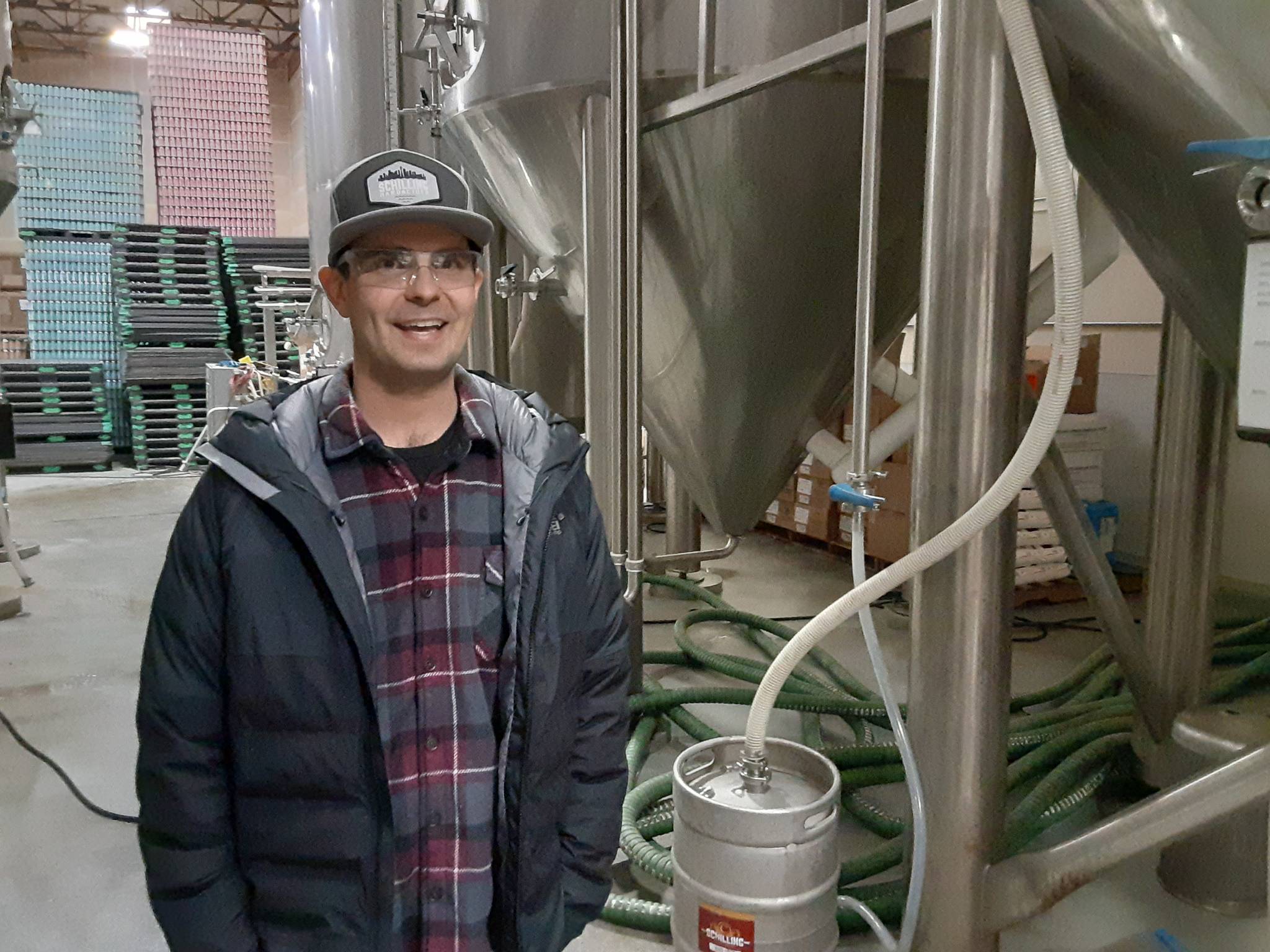Off a deceptively dead-end street in Auburn’s warehouse land, under hard hats and behind protective gear, welders are crawling up and down the metal bones of a warehouse, raining sparks onto the concrete floor.
But with the end in sight of Schilling Cider’s extensive, year-long remodeling project, a lot of impressive change is already in place at 4002 D St. NW.
Already, progress has transformed the 5-year-old plant from a cidery-and-secondary-packaging operation into the fastest canning line dedicated to alcohol in the Pacific Northwest, and one of the Northwest’s fastest canning lines, said CEO Colin Schilling, who co-founded Schilling Cider with CFO Mark Kornei in 2015.
When Schilling’s new tasting room opens on the brand new second floor after a year’s closure, visitors will get a chance to gawk at all that whirring new machinery as they sip and sample, making this absolutely, positively one of the bossest plants of its kind in the whole Puget Sound Region.
“We had hoped to have that open last year, but obviously there have been some slow downs here and there,” Schilling said of the cider tasting room.
Here’s what all that change has wrought.
Ever since the plant opened in 2015, processing of the raw apples into juice has been completed in Yakima in Eastern Washington, and the juices trucked to Auburn and piped directly into enormous tanks, where time and expertise turn the many juice blends into hard ciders.
That has not changed.
Until late last year, however, the Auburn Plant tanked its finished ciders to a local cannery, which filled and seamed the cans before returning them to Schilling for placement into boxes and case trays for distribution. But the company’s multi-million-dollar investment into its own canning and seaming equipment has brought that part of the operation in from the cold and removed the plant’s most significant bottleneck.
All of that is brand new.
And, top to bottom, it has already transformed the company.
“Most other businesses in the greater Puget Sound Area that are of regional scale, their canning lines would be between 80 cans a minute and 300 cans a minute,” said Schilling. “Our can lines can run up to 1,200 cans a minute, which is faster than all the breweries in Seattle combined.
“We also have some pretty trick technology that’s specific to our product. For instance, we have a big pasteurization tunnel, which is a nice way to create shelf stability without chemicals. We also have some cool, secondary packaging to create those six to 12-pack boxes that everybody likes these days, as opposed to the old rings. So we can do that here at high speed. We have one of the newer, high-tech machines to do that kind of operation,” Schilling said.
Work force in place
Until last month, Schilling used a lot of temporary help for its labor-intensive days, primarily because it would do a whole week of production and then nothing for three weeks. But the recent upgrades allow it to retain all those employees for the off times, and have a higher number of high-skilled workers on staff to tend to the machinery.
“In terms of the operation, we’ve been running for months,” Schilling said. “Obviously, with a construction project this big, you’ve got to get running, testing and continue to build, modify, all that kind of stuff. We’re still doing the rest of the building, and at the end of this, we still have to paint the iron and that kind of stuff, but that will go during operations.
“Most of the stuff is highly automated,” Schilling continued, “so what we have done over the past six months is add a couple of employees who are highly trained. A lot of this equipment, especially back in production, could take nine months to learn how to do what we do back there, so it’s a very long training process, and a lot of this equipment needs very highly skilled workers, so we tend to automate Honestly, a lot of it is very mechanical, so you’re fine tuning these machines, you’re adjusting the machines, you’re maintaining the machines. That’s mostly what the folks who are still here do.”
Customers who remember the former tasting room are likewise in for a pleasant jolt.
“Our old tasting room was seats in the warehouse, and a pool table we got off Craig’s List.” Schilling said with a laugh. “I mean, people liked it, but this will be a much nicer vibe.”
To get there, visitors will walk up the stairs to a second-floor room with two bathrooms, long tables, a bar and short tables on the periphery.
“You’ll be able to sit at the bar, there’ll be taps, there’ll be swag for sale, and from the windows you will actually look out onto the production floor,” Schilling said. “The conference room will also be part of the bar, most of the time. It will be something that people can rent out if they want to have, like, a big company get-together or a birthday party for 20 people or so. It can be private while all the rest of the bar is still open.”
The big window that overlooks production will be double-insulated, and the concrete floor will cut out a lot of noise, making the room fairly quiet even when the lines are running, Schilling said. There’ll be televisions, darts and board games similar to stuff they had in the old tasting room, just in a much nicer environment, with light snacks like chips and peanuts.
Among the sippables, the company’s newest: Waveline.
“It’s a hard seltzer, and it also has electrolytes in it, so it’s the best of both worlds,” Schilling said.


